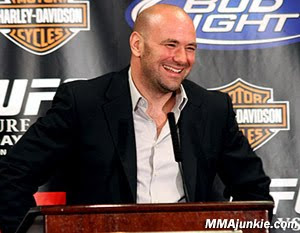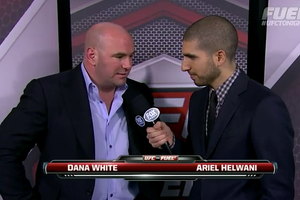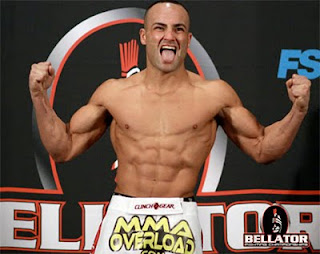“We need more fights,” were the keys words spoken by UFC President Dana White as he spoke to MMAFighting.com’s Ariel Helwani in an exclusive interview announcing that Zuffa had purchased the Strikeforce organization.
Considered by many to be the number two MMA organization in North America; Strikeforce was seen as a major competitor to the Ultimate Fighting Championship. The purchase of the organization immediately brought about thoughts of mega events with the super fights that fans have debated about for years. However, White was adamant to say that things will stay “Business as usual,” and the two organizations will stay separate entities. This means that fighters contracted to Strikeforce will remain with that organization and that they are not employees of the UFC at this time.
In the interview, the conversation touched on a number of topics such as Strikeforce’s partnership with Showtime, the use of Strikeforce’s roster, and the development of women’s mixed martial arts. After watching the interview a couple of times, I’ve thought of these questions that will be asked after the dust settles from this major announcement.
1. How long will things stay “Business as usual?”
That was White’s statement of choice throughout the conversation with Helwani and at this time I believe the UFC President. With a number of specific contracts in place, Zuffa would either have to buy out or find another way out of the obligations their new product must fill. I believe that the two organizations will stay separate organizations for at least a year or two. After those contractual obligations are met we will see a merger of the two organizations, such as what fans just witnessed with the merger of the WEC that took place at the start of this year.
2. What happens to the fighters?
Many fighters on the Strikeforce organization were once UFC fighters or individuals who the UFC had a major interest. Names such as Fedor Emelianenko, Paul Daley, and Light Heavyweight champion Dan Henderson are examples of a few. White stated that these fighters are still employees of Strikeforce and those contracts will be honored. However, once that time is up, I believe that the fat cutting will begin and a number of Strikeforce’s roster will be removed from their positions. What’s interesting is to see if such events as Strikeforce Challengers will stay in place for the development of young talent.
3. Are the women’s divisions doomed?
Dana White and Ariel Helwani touched on the topic of women’s MMA and its place under Zuffa. White has been against women’s MMA because he has stated not enough top tier talent is available in those divisions. However, he also stated that Zuffa and the UFC needs more fights. While, he may be against the development of women’s MMA, the use of some fighters such as Cristiane Santos, Miesha Tate, and Gina Carano could remedy that problem. Personally, I believe that women’s MMA has begun to grow at a slow rate, but still grow. This may be the most interesting development of this deal.
4. What happens to Scott Coker?
According to Dana White, Scott Coker will stay in his place as the leader of Strikeforce. After numerous questions from Helwani, it is apparent that Coker will stay in his role. Coker will be in charge of handling fighter’s negotiations and any other tasks as he normally would, at this moment. Again, I believe this is in place only until the contractual obligations of the Strikeforce have been met. After that I believe that Coker will take a more behind the scenes role with the organization.
5. Is this good or bad for Mixed Martial Arts?
Many fans have compared this to the WWE/WCW merger that happened in 2001, but that is far off. This purchase has the potential to change the game the way the NFL-AFL or NBA-ABA mergers changed both of those sports. With one main organization to represent MMA in this country and beyond, the growth of MMA continues to be pushed to new heights. I believe this will impact the legalization of MMA in New York and other states, as well as, help the sport become more mainstream. Fighters will feel pain of the monopoly but that will force stiffer competition from those who do step into the cage. Overall, I expect this announcement to have a strong, positive effect on the mixed martial arts world.
Mark down March 12th 2011 as one of the most important days in MMA history to date. The UFC is known for continually pushing the envelope and did just that by purchasing Strikeforce.





I'm of the opinion that Strikeforce will be handled much like WEC, but that doesn't mean that the results will necessarily be the same. In addition to the fighters and fight library, Zuffa now profits from the CBS/Showtime MMA venture. They will milk that as long as possible rather than liquidate and lose out.
Zuffa will also look to profit from other unique opportunities that Strikeforce presents, such as the women's divisions and deadend entertaining match making.
1. I tend to agree that we will see things remain the same until key contracts expire. Michael, what prospects do you think will get phased into the UFC and why?
2. I don't see this as an opportunity for White to cut fighters at all, in fact the opposite. Strikeforce is a place to generate revenue off fighters who are excluded from fighting for UFC or have refused to do so.
3. Similarly this is an opportunity to maintain a staging ground to build up the women's divisions until they are mature enough to meet UFC standards, similar to the featherweight and bantamweight divisions. There's no way UFC maintains any immature divisions, but this is Zuffa's opportunity to circumvent that requirement.
Zuffa has an opportunity to run multiple organizations with different MOs. I don't see them throwing that away until they can fully capitalize on those models, which will take a very long time.
I'm of the opinion that Strikeforce will be handled much like WEC, but that doesn't mean that the results will necessarily be the same. In addition to the fighters and fight library, Zuffa now profits from the CBS/Showtime MMA venture. They will milk that as long as possible rather than liquidate and lose out.
Zuffa will also look to profit from other unique opportunities that Strikeforce presents, such as the women's divisions and deadend entertaining match making.
1. I tend to agree that we will see things remain the same until key contracts expire. Michael, what prospects do you think will get phased into the UFC and why?
2. I don't see this as an opportunity for White to cut fighters at all, in fact the opposite. Strikeforce is a place to generate revenue off fighters who are excluded from fighting for UFC or have refused to do so.
3. Similarly this is an opportunity to maintain a staging ground to build up the women's divisions until they are mature enough to meet UFC standards, similar to the featherweight and bantamweight divisions. There's no way UFC maintains any immature divisions, but this is Zuffa's opportunity to circumvent that requirement.
Zuffa has an opportunity to run multiple organizations with different MOs. I don't see them throwing that away until they can fully capitalize on those models, which will take a very long time.